How To Thin Out Hair: Best DIY And Thinning Scissor Methods
Let go of the unbearable weight of extremely thick hair with some smart thinning methods.
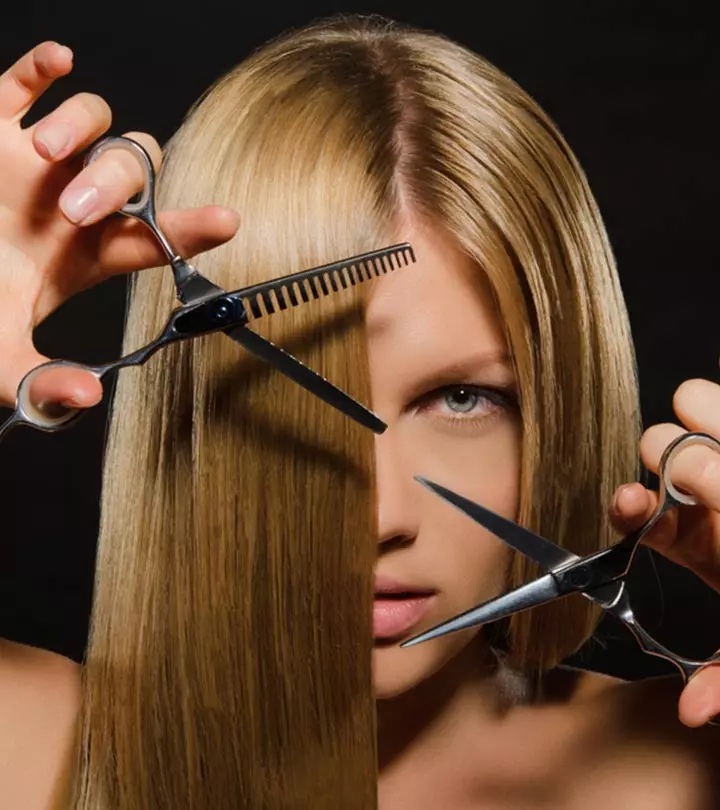
Image: Shutterstock
Maintaining thick hair is like pruning your garden – it takes a lot of effort! Without the right care, thick hair becomes dry, frizzy, and looks unkempt. This is why most thick-haired people opt to thin out hair.

Thick hair looks lusciously voluminous. There are many hairstyles to experiment with when you have thick tresses. But detangling and maintaining your thick locks requires time, effort, patience, and some TLC. The next best option is hair thinning. How to thin out hair without damaging or affecting its texture permanently becomes a priority.
Explore the different hair thinning techniques and learn if you can try them at home. Discover products, tools, and hacks that can help thin out hair. Keep reading to know more.
In This Article
How To Thin Out Hair: Simple Tips And Tricks
In this section, we have categorized hair-thinning methods based on various factors:
A. Use The Necessary Tools And Products
1. Straightening Treatments Work Like A Charm
If you are all about taking the simpler route, go for a straightening treatment. If done correctly, it adds layers to your hair while reducing your hair volume. You may also go for less permanent hair treatments such as keratin hair treatment, which allows you to retain your hair texture while making your hair look thinner.
2. A Good Old-fashioned Haircut
It is a good idea to use thinning shears to maintain your hair’s inherent shape as well as volume. You can go for a haircut if you only wish to thin out your hair a bit. A layered haircut is the best way to reduce the volume of your hair.
 Quick Tip
Quick Tip3. Go Blunt To Get Rid Of Thinner Hair
To get rid of thinner ends for good, cut your hair blunt. A blunt cut is a hairstyle where the hair is trimmed straight across without layers, creating a sharp, even edge. A blunt cut effectively removes dead, dry, and split ends, promoting healthier hair.
4. Experiment With Products To Find The Right Fit
- Try your hand at various hair straighteners, shampoos, serums, and conditioners to understand how to control hair volume. Pick products that boost hair growth and ensure your tresses remain healthy.
5. Go The DIY Route And Get Expert-approved Thinning Shears
Thinning shears are not your regular pair of scissors. These have a blade on one side and a comb-like blade on the other. Here are the available options for your reference:
- Texturizing hair thinning scissors
- Finishing hair thinning scissors
- Chunking hair thinning scissors
6. Upgrade Your Hairstyling Routine
Always stock up on anti-frizz products. However, avoid products that add extra volume. You can use hair serums that coat the hair, preventing humidity from entering and further bloating your hair.
7. Opt For Sulfate-free Shampoos
As much as we all love lather, sulfate-based shampoos strip your hair of natural oils, making it look damaged and dry (1). A sulfate-free shampoo can maintain hair density and add a healthy sheen without making it look “big” and frizzy.
B. Update Your Hair Care Routine
1. Do Your Homework On The Ideal Method For Hair Thinning
Most stylists use thinning shears to achieve a thin look. However, some use razors, which can make your hair ends look dry, uneven, and frizzy. So always use high-quality thinning scissors to avoid any hair disasters.
2. Switch To Hydrating Shampoos And Conditioners
Frizzy hair is every thick-haired person’s biggest pet peeve. Pick up a hydrating shampoo and conditioner to smoothen out your hair. You can also load up on intensive hair masks and deep conditioners that nourish your hair, making it more manageable.
3. Say Goodbye To Heat Styling
Heat styling makes your hair dry and brittle (1). Let your hair air-dry to retain its natural texture and boost hair growth. You can also invest in leave-in products to apply after a shower or heat protectants if you blow-dry your hair. All of these products smoothen your hair and make it look less thick.
4. Brush Your Hair From The Tips To The Roots
Believe it or not, your hair-brushing technique says a lot about your hair loss. To tackle the same, use a boar-bristle brush and detangle your hair from your ends and work your way up to your roots. Make sure to be extra gentle on your ends.
5. Focus On Areas With Good Hair Growth
Typically, the hair near the face does not require thinning . Instead, start by trimming from the back and side sections of the head. Whatever you do, avoid working too closely to the scalp with thinning shears because it will stick straight out.
6. Cut Your Hair When It Is Dry
Always trim your hair after it has dried. It allows you to see how your hair will feel and look in real-time. Note that when hair is cut wet, it responds to the scissors differently. So, the exact same haircut will look different when cut wet and when cut dry. Curly hair tends to do better when cut dry but straight hair does better when cut wet.
7. Do Not Use Hot Water During Hair Wash
Showering with hot water is harmful to your hair. Hot water strips the hair of its natural oils and moisture, making it look frizzy. Always use cold water when you want to thin your hair out.
C. Be Warned Of The Results
1. Prepare Yourself Mentally For A Different Look
Like with every hair cut, drastic or otherwise, your overall look will change, so prepare yourself mentally.
2. Get Used To Dirtier-than-usual Hair
Thick hair does not need regular washing
. But if you want to thin out your hair, you need regular, more frequent hair washes. This is because it builds up residue and gets dirty faster.
3. Styling Your Hair Can Swing Both Ways
Once your hair thins out, hair styling with it may become difficult. This is because your hairstyles may fall flat faster than usual.
4. Maintenance May Become Easy (Or Equally Painful)
A blunt cut is expert-recommended when it comes to achieving a thinner look. Naturally, maintenance then becomes a cakewalk. However, remember that a blunt cut is more susceptible to damage and dirt. So, you may need to pamper it with deep conditioners and hair masks more regularly.
D. Alter Your Lifestyle Habits
1. Tackle Hair Loss By Consuming Healthy Fats

Alter your diet to include hair-loving foods. Foods with fatty acids boost hair growth and prevent hair loss. A study found that fermented fish oil (FFO) extract from mackerel and its omega-3 component, DHA, can promote hair growth. It stimulates hair follicle cells, speeds up the growth phase, and activates signals supporting hair regeneration (2). They also tackle scalp inflammation effectively.
Include foods rich in healthy fats and omega-3 fatty acids, such as:
- Avocados
- Whole eggs
- Salmon
- Chia seeds
- Hemp seeds
- Walnuts
- Flax seeds
- Edamame
- Kidney beans
2. Go Inwards And Address Hormone Issues
Hormonal issues like low estrogeni A hormone responsible for the regulation of the female reproductive system and the development of female characteristics. levels, thyroid dysfunction, PCOSi Polycystic ovarian syndrome, a hormonal imbalance caused by ovaries that produce excess male sex hormones and lead to irregular periods. , alterations in DHTi Dihydrotestosterone, a male sex hormone that contributes to the development of male characteristics, which also is linked to hair loss. or prolactini A hormone released by the pituitary gland that causes the breasts to grow and produce milk during pregnancy and after childbirth. levels are linked to hair loss. Stress and menopausei The natural cessation of a woman’s menstrual cycle between her 40s and 50s where her reproductive hormones start to decline. are some major reasons for a drop in your estrogen levels (3). So look for natural ways to lower your stress and tackle hormonal issues organically. You can also consult your doctor about supplements to boost hair growth.
Now that you know the important factors to keep in mind when going for any kind of hair thinning treatment or DIY method, let us tell you all about how to thin out hair using thinning shears on thick hair.
Key Takeaways
- Keratin treatment retains hair texture while making the hair look thinner.You can also use cold water to thin your hair out.
- Straightening treatments and old–fashioned hair cuts are simple ways to make your hair appear thinner.
- Thin hair needs regular washes as it gets dirty faster. So, go for anti-frizz products and avoid products that add extra volume.
How To Thin Out Thick Hair With Thinning Scissors: A Step-by-step Guide
Before you choose a thinning method, it’s important to evaluate your hair type and how thick it is. Hair textures vary! What works for one person may not work for another. Thicker or coarser hair may need a different technique compared to fine hair to avoid unwanted damage and ensure you get the results you want.
Hair care experts tackle thick hair with hair-thinning scissors – a technique that can be replicated at home, too. So if you have ever wondered how to thin hair using thinning scissors, we have got you covered.
1. Select The Right Scissors
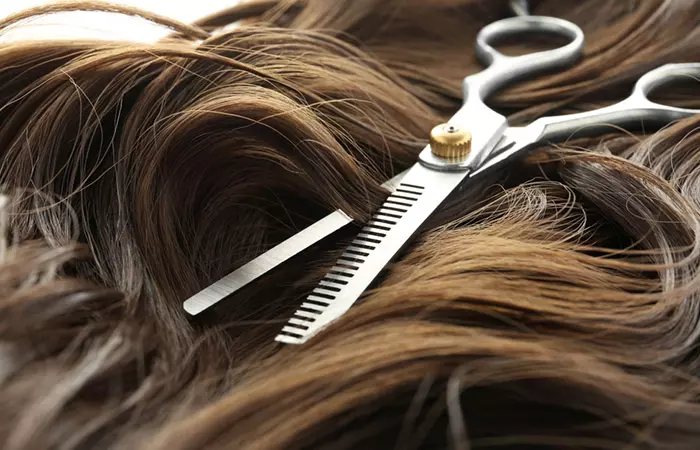
If you think that just about any pair of hair shears will work like a charm, think again. Thinning your hair requires the use of special thinning scissors.
These scissors generally have a normal blade on one side and a notched blade on the other side that removes less hair with each cut. There are multiple brands available, so speak to your hair consultant and choose the right one.
2. Divide Your Hair
Start by dividing your hair into sections using a comb or your fingers (as per your preference). Remember that your fingers work best for a softer look. If you want a cleaner, more defined look, you can use a comb.
3. Clip Up Your Hair
Next, use hair clips to hold the sections in place.
4. Start At The Bottom
The rule of thumb is to always start trimming from the bottom and move onto the higher layers of hair gradually.
5. Cut Upward
Take an under-section of hair in your hand and cut it in the middle – about halfway between your hair-ends and your scalp. Do not cut any further.
6. Cut Downward
At no point should you trim the full section of the hair you are holding. Simply keep pulling the scissors away once you have cut upwards.
Then, flip the scissors so that it faces the floor and start cutting downward through the other half of the section. This up-and-down cutting technique will allow your hair to look natural and even. However, if not done correctly, it may cause irreparable damage and leave the cuticle in terrible condition.
7. Comb, Comb, Comb
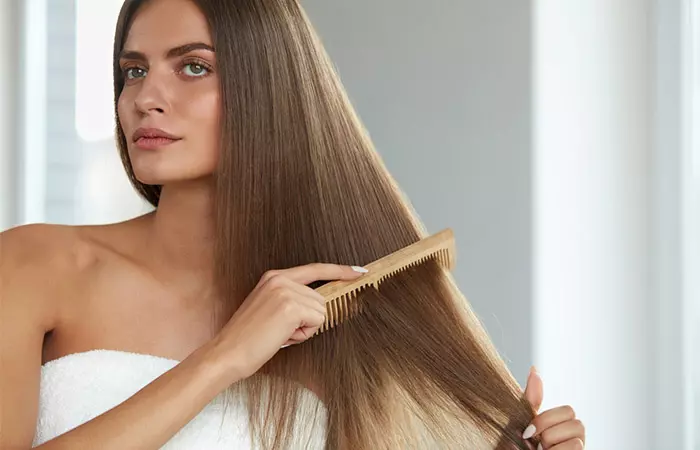
The importance of regularly combing your hair cannot be stressed enough. Keep combing the just-trimmed section for an even look.
8. Move Toward The Ends
Once the lower layers are taken care of, move upwards and keep snipping farther down the hair shafts. Once you reach the outermost layer of your hair, use your thinning scissors only on the very hair-ends. Failure to do so will result in a crop of poker-straight hair.
9. Stick To A Monthly Ritual
Unlike a normal hair trim, thinning your hair should be done sporadically. If you use thinning scissors, be careful not to go overboard and stick to doing it just once a month.
10. When In Doubt, Consider Expert Help
Let us set the record straight: thinning your hair at home is tricky business. If you think the job will go awry, play it safe and leave the hair thinning to a professional.
There is a simpler way of reducing your hair thickness, especially for those who wish to avoid using scissors altogether. If you are wondering how to make thick hair thin without cutting, check out the next section!
How To Make Thick Hair Thin Naturally (No Cutting Required)
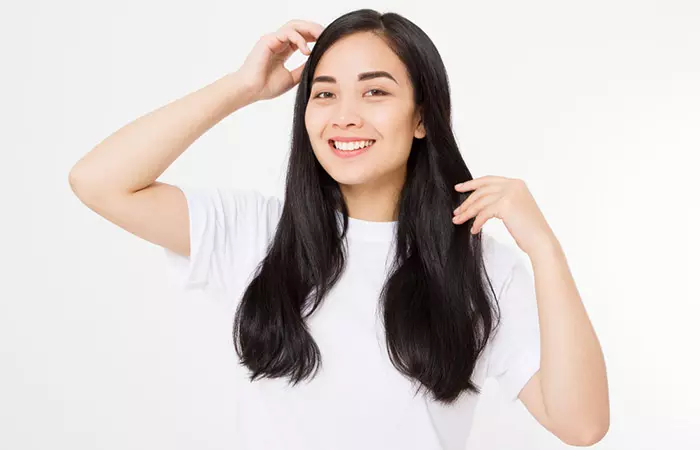
- Divide your hair into two sections, horizontally.
- Take the top-half section and clip it up in an effort to push it out of the way.
- Grab your hair from the bottom section and section it off into two. Make sure to leave some hair down underneath.
- Make two braids with each section and tie it up with a small hair elastic.
- Twist the braids around each other into a bun, keeping them flat on the scalp. Make sure not to overlap them.
- Use bobby pins to push the ends of the braids and loose sections to the back of your head.
- Finally, take your top hair section and pull it over the braids to hide them.
 Quick Tip
Quick TipVoilà! You now have instantly thinner hair at home, without any cutting.
Wrapping Up: To Thin Or Not To Thin?
As contradictory as it may sound, having thick hair is a blessing in disguise. You can style it any way you want and consider multiple options if you want to thin out thick hair. There are also various techniques and treatments to explore if you are wondering how to get thicker hair. At the end of the day, it comes down to your personal choice.
Infographic: Benefits Of Thinning Out Your Hair
Is your hair simply out of control? Does it feel too heavy on your head? Do you feel that your curls are being buried or dragged down? Then, you should think about thinning out your hair. Note that hair thinning procedures are not simply used to thin out your hair. They are also used to add texture, volume, interest, and style to a wide range of hairstyles and hair types. Check out the infographic below to find out some of the benefits of thinning out your hair!
Some thing wrong with infographic shortcode. please verify shortcode syntax
There is a fine line between beautifully thick hair and unmanageable thick hair. Embracing unruly thick hair can be tough. If you are wondering how to thin out hair without making it look flat, the above-mentioned tips can help. Apart from thinning out your hair with thinning scissors, you can also try to naturally thin it out with the help of braids and bobby pins. You can try additional tips such as using the right hair tools and products, updating your hair care regimen, and altering your lifestyle habits. While thinning out your hair may seem like a great option, you have to mentally prepare yourself. Your hair may not look the same, and you may need to switch your hair products to suit your thinner hair texture. Your hairstyles and maintenance practices may also need to change.
Frequently Asked Questions
Does thinning out hair damage it?
No. Thinning out your hair using thinning shears does not damage your hair if done correctly.
What do thinning scissors do to your hair?
Thinning scissors cut your hair in even sections to alleviate the excess weight, blend between sections, and soften lines without changing your haircut.
Does layering hair make it thinner?
Yes. Layering can remove excess weight from your hair and make it look thinner.
What is the difference between layering and thinning hair?
You can see the distinct layers of hair in layering, while hair thinning forms interior layers that are not visible. Thinning shears remove bulk and weight and not length like layers do.
Will my hair grow back after using thinning scissors?
Yes. Your hair will grow back as normal hair growth is not affected by thinning scissors.
What are the risks of thinning hair at home?
If you thin your hair at home without proper knowledge, you may end up with uneven results or damage your hair’s texture. It’s best to consult a professional if you are not confident about using the right technique or tools.
Ready to tackle thinning hair at home? Watch this video that explains the process of using thinning scissors to achieve a balanced look.
References
Articles on StyleCraze are backed by verified information from peer-reviewed and academic research papers, reputed organizations, research institutions, and medical associations to ensure accuracy and relevance. Read our editorial policy to learn more.
- Hair Cosmetics: An Overview
https://pmc.ncbi.nlm.nih.gov/articles/PMC4387693/ - Mackerel-Derived Fermented Fish Oil Promotes Hair Growth by Anagen-Stimulating Pathways.
www.ncbi.nlm.nih.gov/pmc/articles/PMC6164340/ - The Hormonal Background of Hair Loss in Non-Scarring Alopecias
https://pubmed.ncbi.nlm.nih.gov/38540126/
Read full bio of Madison Dufour
Read full bio of Arshiya Syeda
Read full bio of Ramona Sinha
Read full bio of Medha Deb









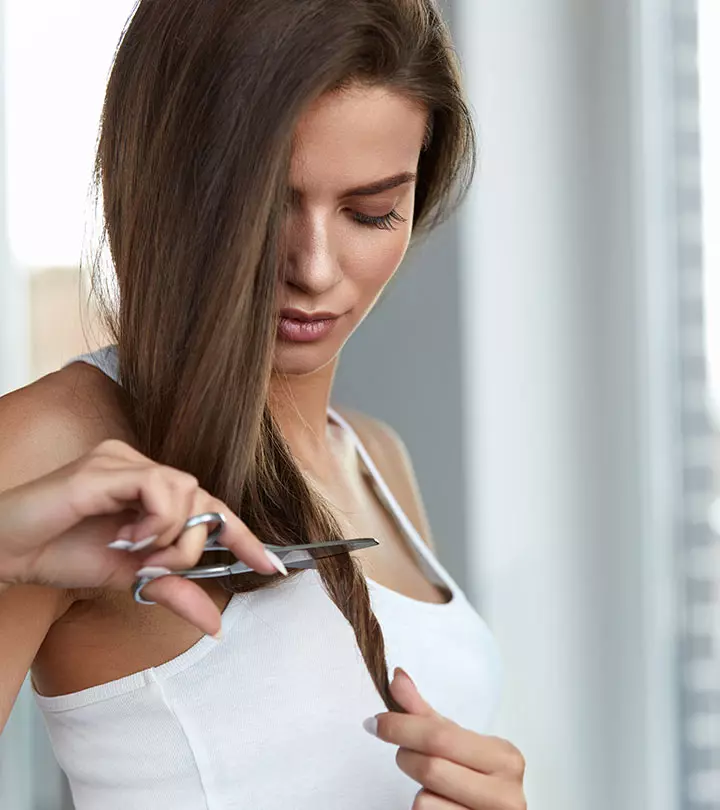
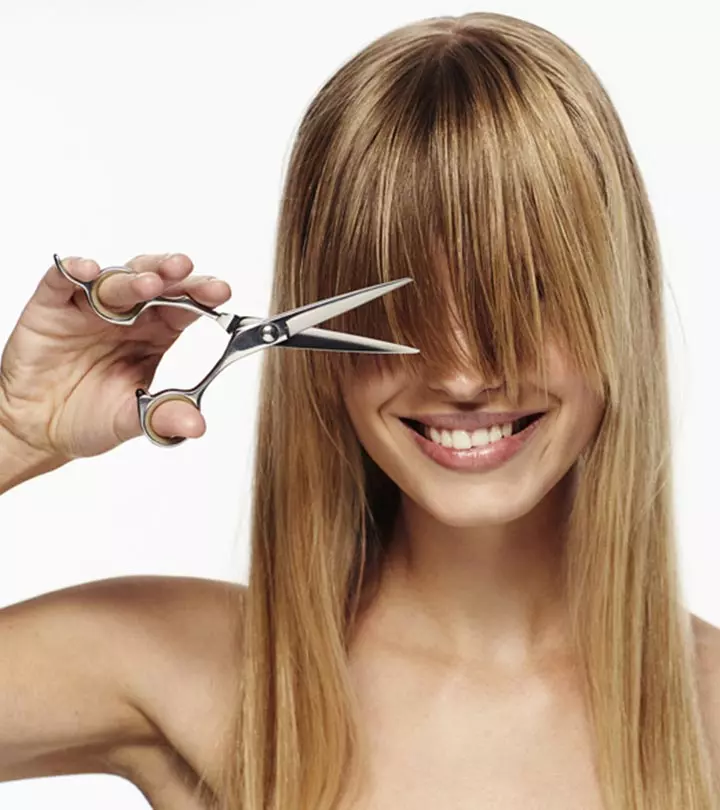
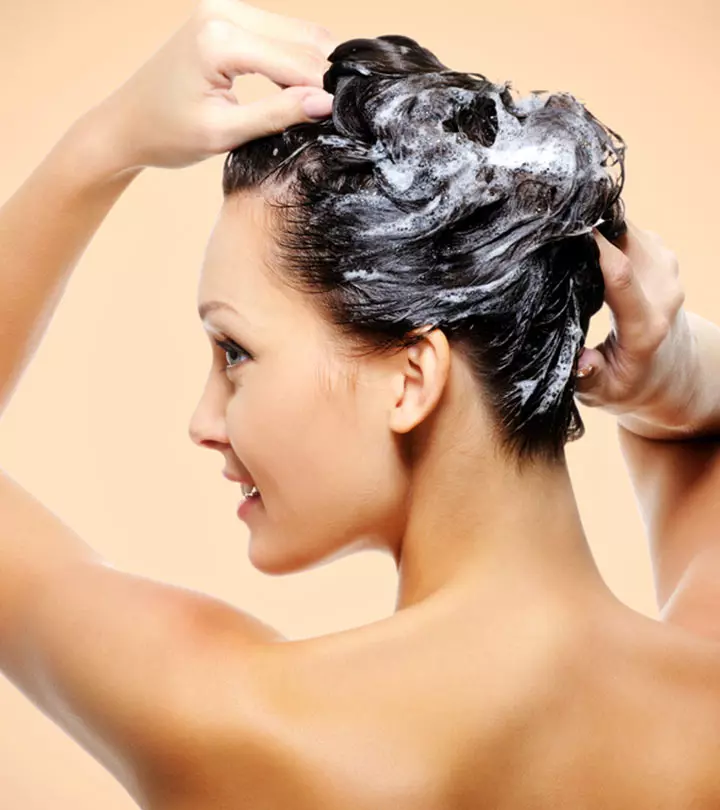
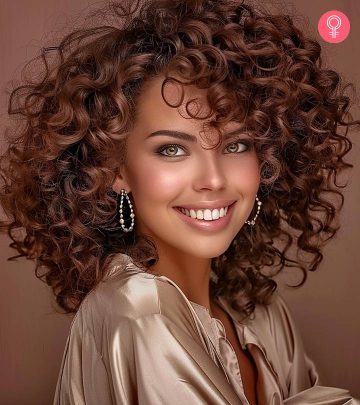


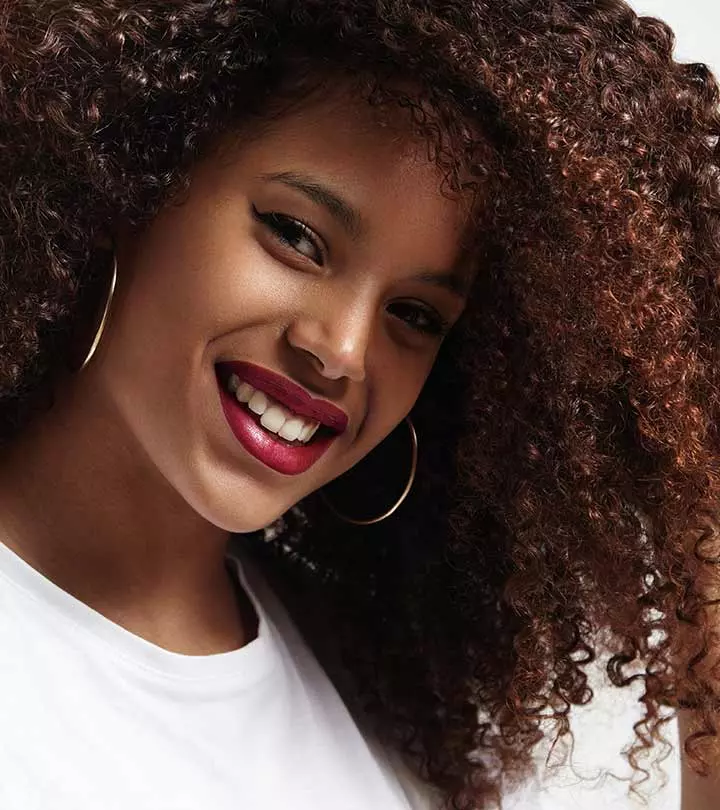

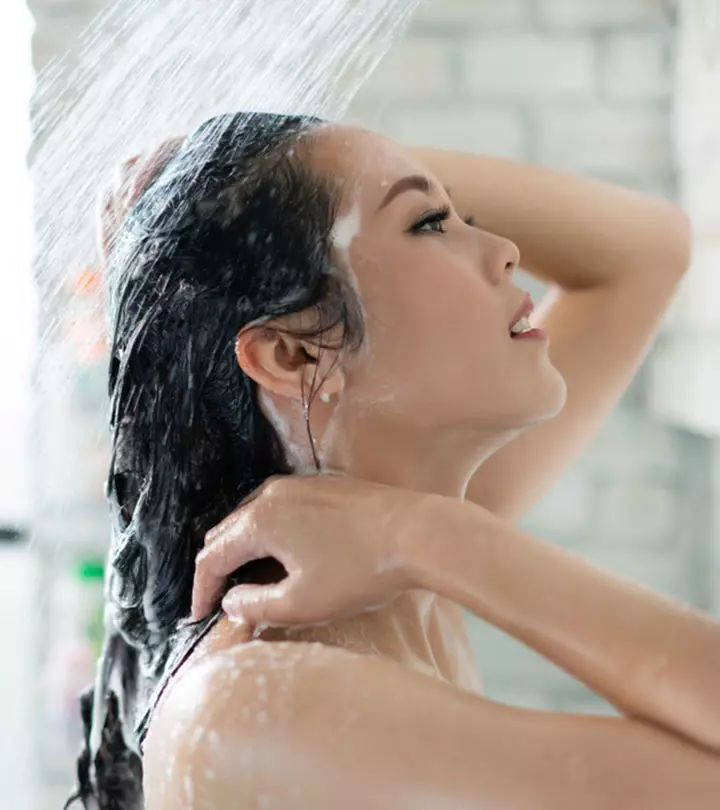
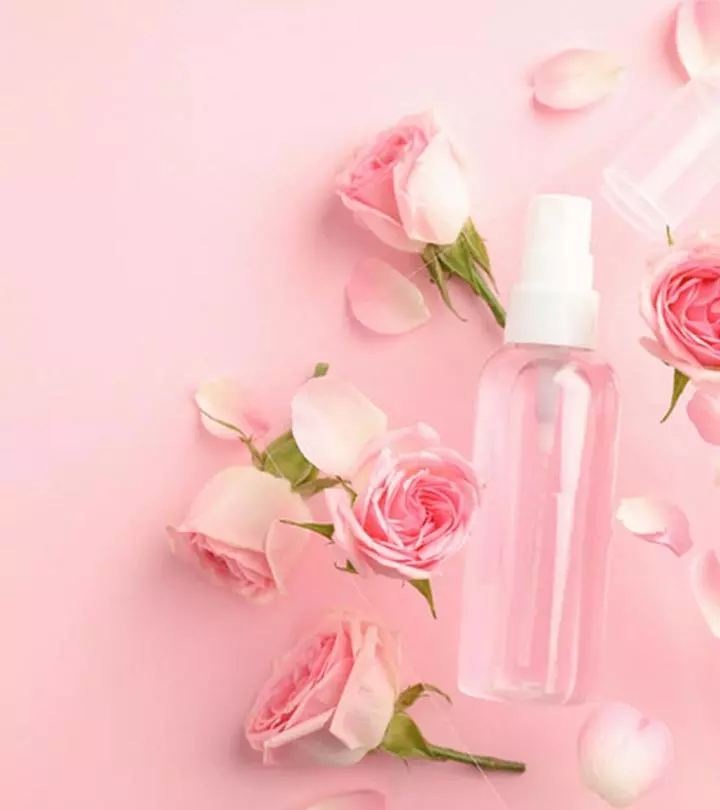

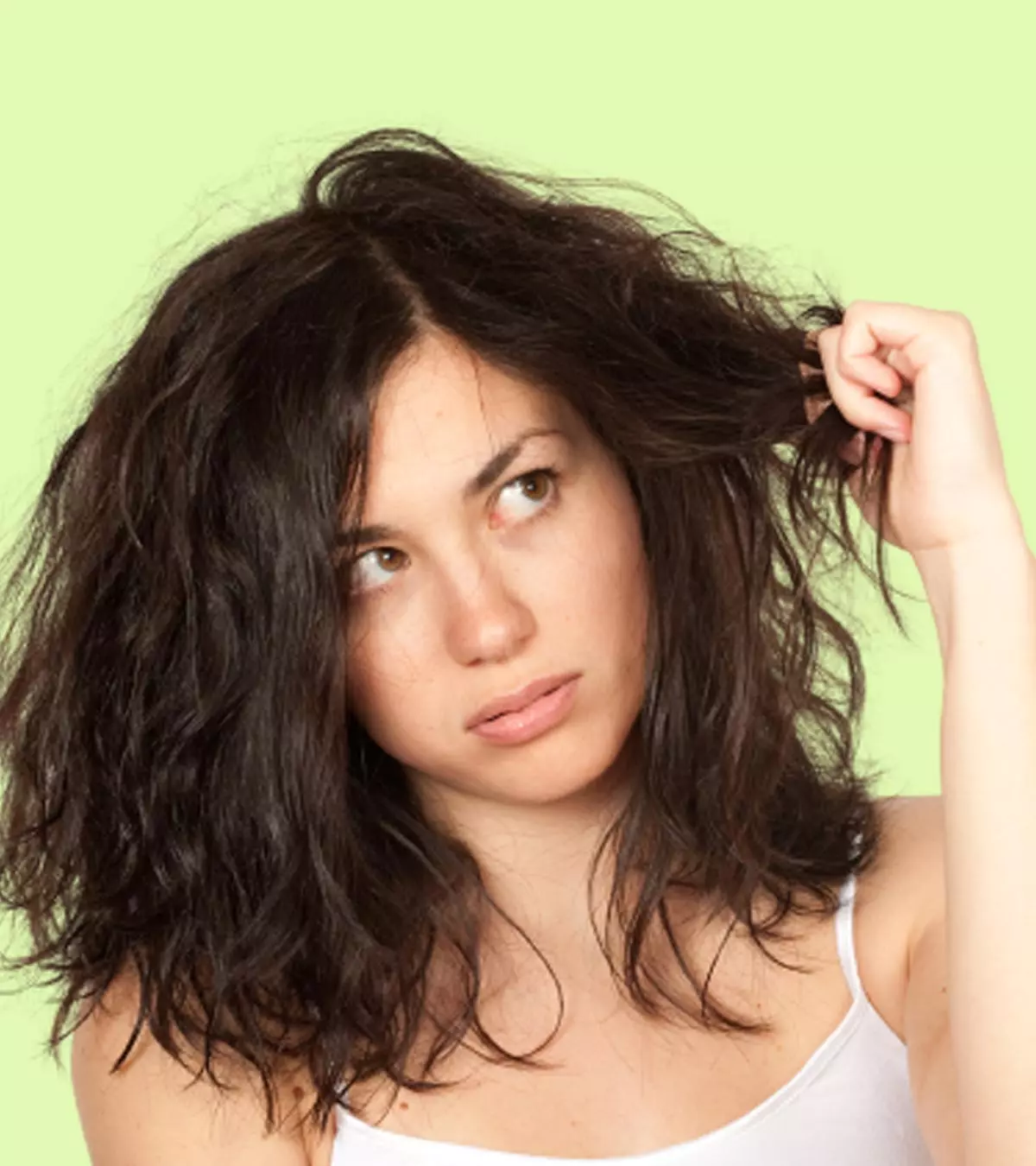

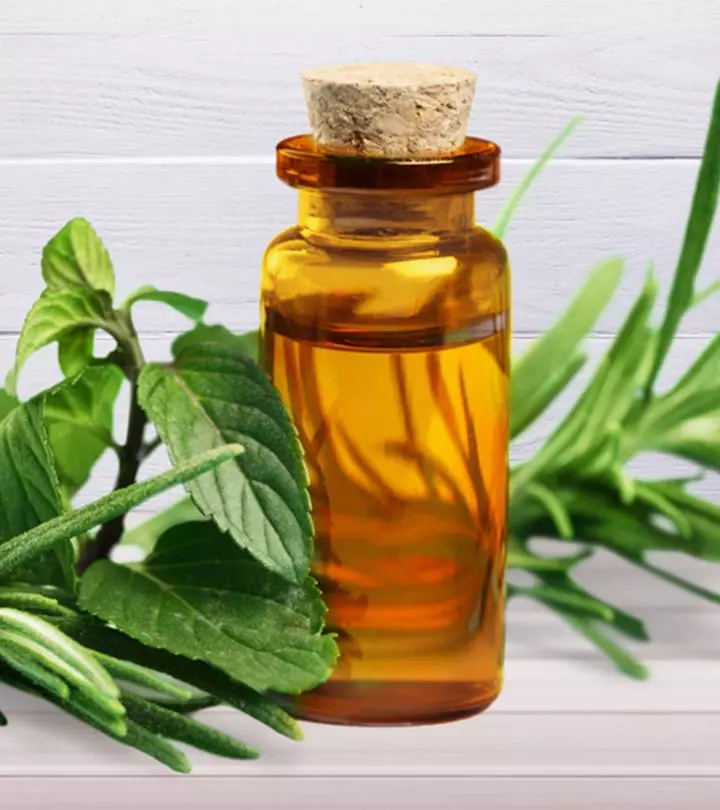
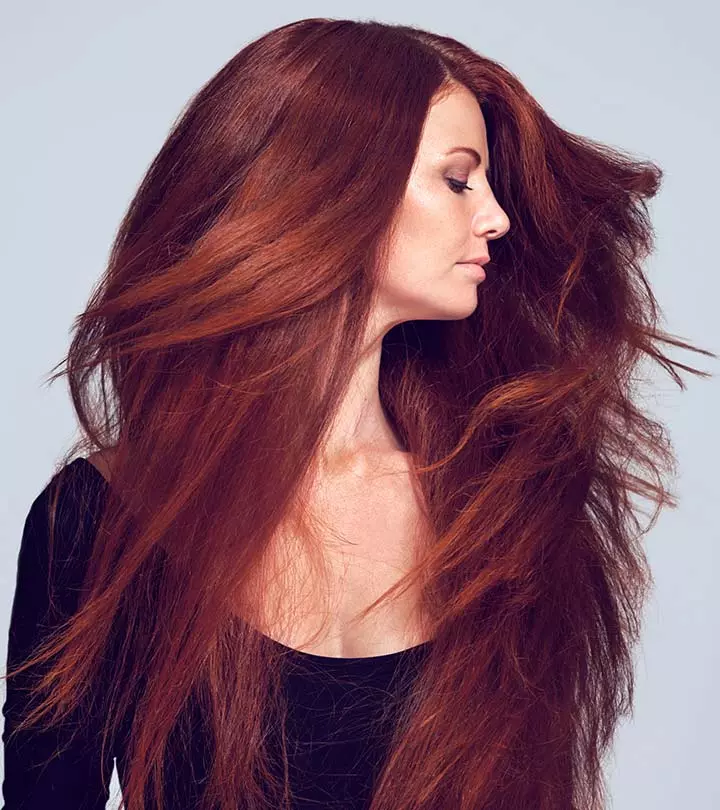
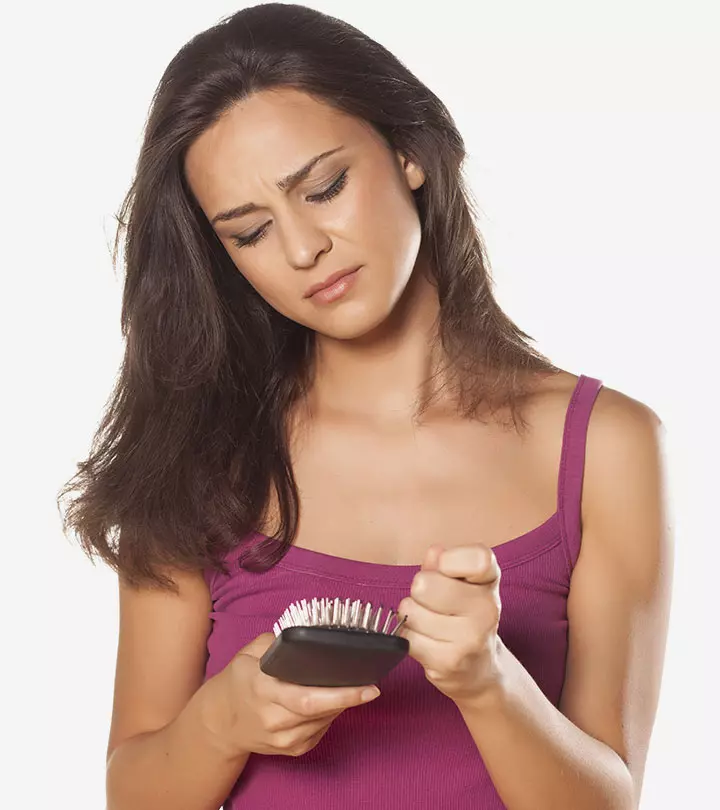
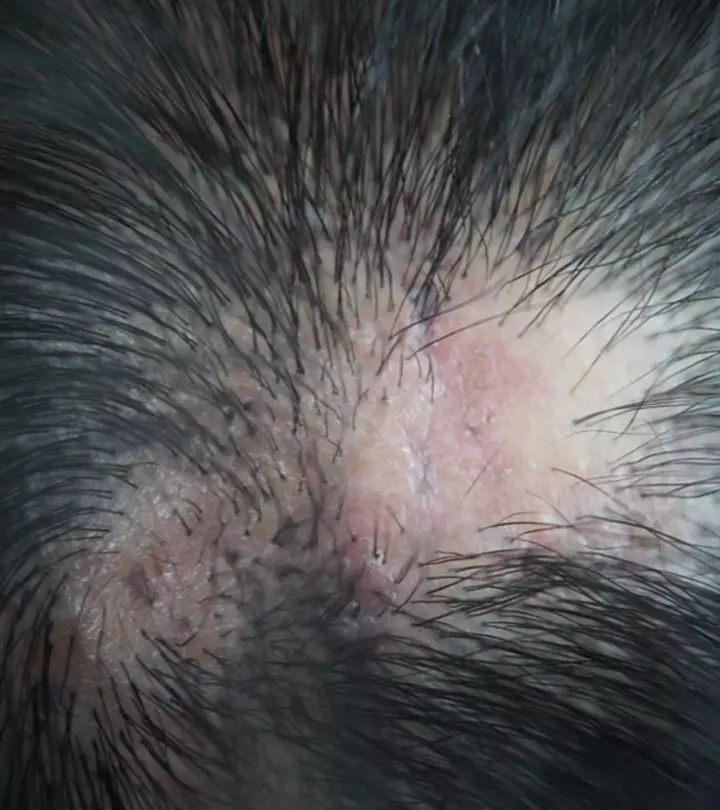
Community Experiences
Join the conversation and become a part of our empowering community! Share your stories, experiences, and insights to connect with other beauty, lifestyle, and health enthusiasts.